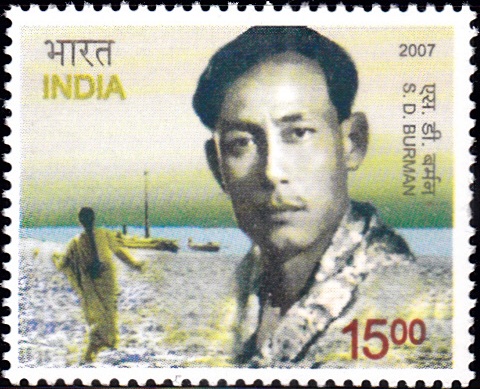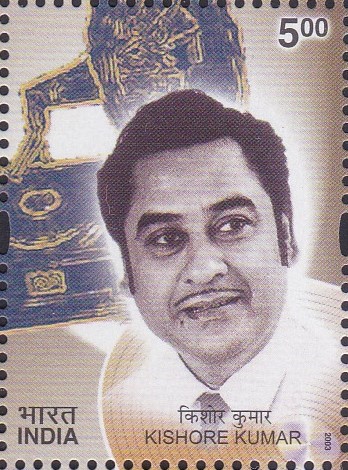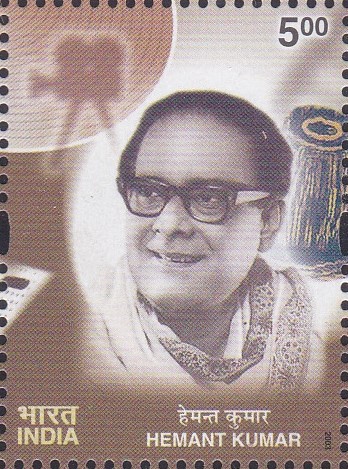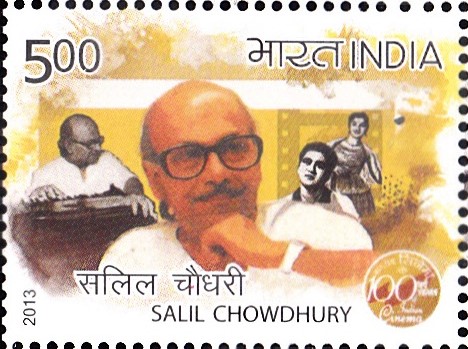
Sachin Dev Burman
A commemorative postage stamp on the Birth Centenary of S.D. Barman, an Indian music director and singer :
Issued on Oct 1, 2007
Issued for :The Department of Posts is proud to release a commemorative postage stamp on Sachin Deb Burman.
Credits :
Stamp & FDC : Bharati Mirchandani
Cancellation : Alka Sharma
Type : Stamp, Mint Condition
Colour : Multicolour
Denomination : 1500 Paise
Stamps Printed : 0.4 million
Printing Process : Wet–offset
Printer : Security Printing Press, Hyderabad
Name : Kumar Sachindra Dev Barman
Born on Oct 1, 1906 at Comilla, British India [now in Bangladesh]
Died on Oct 31, 1975 at Mumbai, India
About :
- Sachin Deb Burman was a maestro, whose music emerged from the core of perpetual Bengal life, its rivers and joy, love and pangs of separation perceived by its people. His haunting melodies, enchanting and yet melancholic, had the effect of carrying the spirit, like a wandering minstrel, incessantly in anxious search. Born in Comilla, Bengal (now in Bangladesh) on 1st October 1906 in the royal family to father Nabadwip Chandra and mother Nirupama Devi of Tripura, he began his training in classical music under his father, sitarist and Dhrupad singer, Nabadwipchandra Dev Burman, who was actually his first musical guide.
- He received his education in Comilla obtaining a B.A, in 1924. His initial exposure to music came from Vaishnava singers, mystics like Baul and Faqirs, and from spiritual and devotional songs like Mushida, Dubishi, Kirton, Agamony, Vijoya, Jari of Moharrum and folk songs related to worship of fish incarnation and snake deity Manasa, songs interpreting canvas of Ghazi and so on. This provided him with a unique capacity to appreciate musical nuances.
- He travelled to the interior of what is now Bangladesh, in the districts of Mymenshing, Comilla, Brahmanbaria collecting a variety of folk songs, notes and absorbing their characteristic style of singing. During those days after Durga Puja and during Holi, music conferences were organized at the ancestral home of S.D. Burman, where accomplished musicians from various places of India used to visit. S. D. Burman thus had an opportunity to listen to the recitals of many accomplished musicians.
- S.D. Burman left for Kolkata sometime in 1924, outwardly for academic pursuit, though he contemplated something deeper. He received lessons of music and became a disciple of Krishna Chandra Dey, the unrivalled music master of those days. Thereafter he came in contact with Shyamlal Kshetri, Badal Khan, Bhishmadeb Chattopadhyay which helped shape his musical genius.
- Under the influence of Krishnachandra, who taught him the Dadra style of singing, and Bhishmadeb Chattopadhyay, Sachin Deb Burman gradually developed his own signature style.
- His first song recordings were done in 1923 at the behest of Hindustan Musical Company of Kolkata.
- His first film as a singer was Sanjher Pidim (1935). He became a music director initially in Calcutta with Rajgee (1937). He overwhelmed the world of music in Kolkata before leaving for Bombay in 1944.
- As a music director of Hindi films, he began his works with Filmistan and provided music in five films : Shikari, Eight Days, Do Bhai, Sabnom, Munimji and Paying Guest. He settled in Bombay permanently. He was able to realise the magical effect of peppering his music with popular, western and folk tunes while following a base of classical music. He also realised that film songs are not supposed to appease connoisseurs of classical music and thus he made up his mind to create light tunes suitable for commoners. He gave unforgettable musical presentations one after another through the films like Kagaz Ke Phool, Bombai Ka Babu, Sujata, Kala Bazaar, Bandini, Pyasa, Guide, Jewel Thief, Aradhana, Prem Pujari, Talash, Abhiman, Anurag, Kalapani, Taxi Driver, Munimji and so on. He also gave music for Guru Dutt classics Pyaasa (1957) and Kaagaz Ke Phool (1959) and he was right on target with ‘Jinhe Naaz hai Hind‘ and ‘Waqt ne Kiya Kya Haseen Situm‘. The soundtrack of Devdas (1955) was composed by him.
- As a singer, his thin but powerful voice was often used as bardic commentary e.g. Wahan Kaun Hai Tera from Guide or Safal Hogi Teri Aradhana from Aradhana. Whatever he sang or made others sing, every thing was grasped by the people eagerly. People used to get fascinated with his obsessive type of voice.
- The lovers of Bengali Music avidly waited when the days of puja (adoration of Goddess Durga) would come. In fact, some records of S.D. Burman‘s Bengali songs were released only during puja festivity. In the musical life of S.D. Burman, his wife Mira Deb Burman with her manifold quality played a rare pivotal role.
- As a great poet Goethe thus observed, ‘The true source of all musics in this world is folk songs‘. S.D. Burman had been a maestro for a long tenure in Bombay film industry making the folk songs a vessel of his own. He was awarded the Sangeet Natak Academy Award in 1958. S.D. Burman went into coma while recording the song Badi sooni (sung by Kishore Kumar) for the film Mili and died on October 31,1975 in Bombay (now Mumbai) but his music haunts us till today.
- Text : Based on material provided by the proponent.









[…] music. Shankar Jaikishan, O.P. Nayyar, Madan Mohan, C. Ramachandra, Salil Chowdhury, Naushad and S.D. Burman – all with their distinct styles – produced some of the most unforgettable melodies. […]